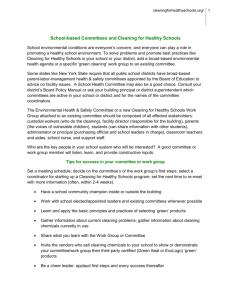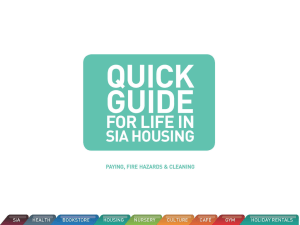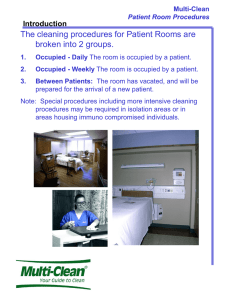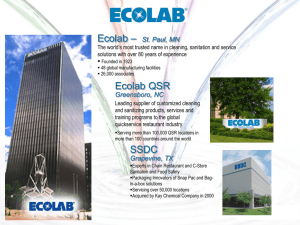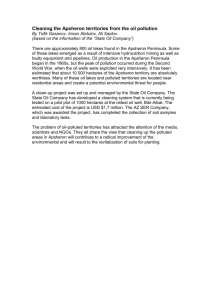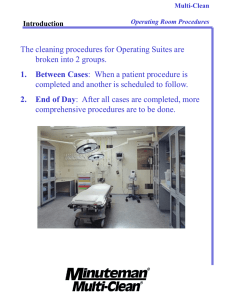FY13 Wet Cleaning Grant Description
advertisement
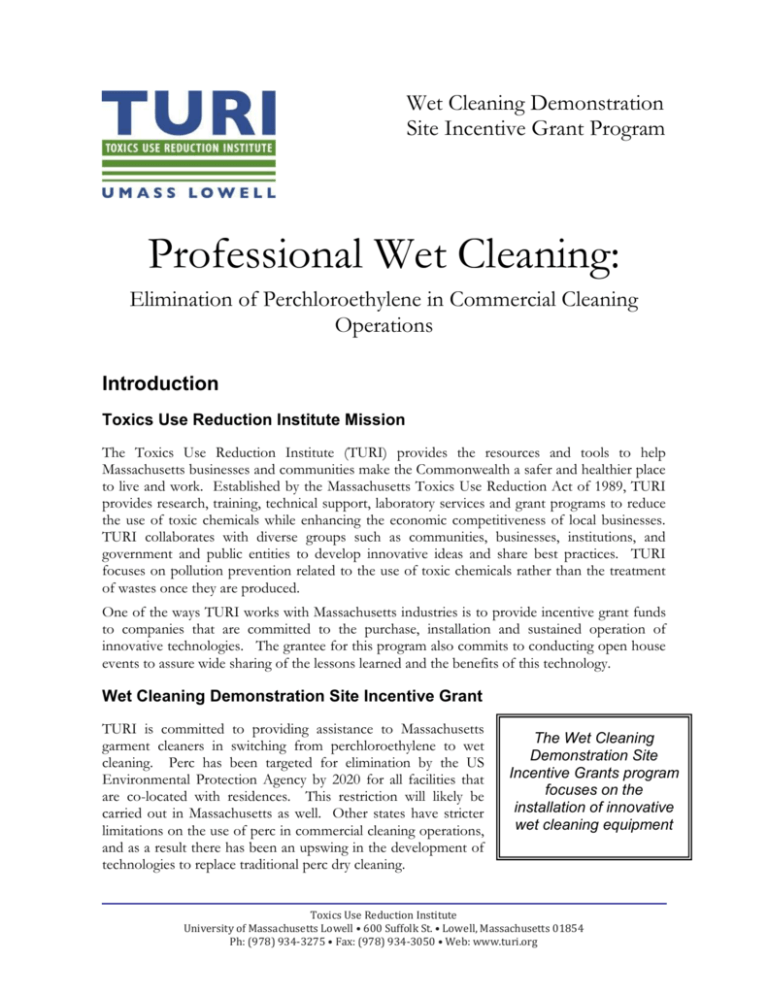
Wet Cleaning Demonstration Site Incentive Grant Program Professional Wet Cleaning: Elimination of Perchloroethylene in Commercial Cleaning Operations Introduction Toxics Use Reduction Institute Mission The Toxics Use Reduction Institute (TURI) provides the resources and tools to help Massachusetts businesses and communities make the Commonwealth a safer and healthier place to live and work. Established by the Massachusetts Toxics Use Reduction Act of 1989, TURI provides research, training, technical support, laboratory services and grant programs to reduce the use of toxic chemicals while enhancing the economic competitiveness of local businesses. TURI collaborates with diverse groups such as communities, businesses, institutions, and government and public entities to develop innovative ideas and share best practices. TURI focuses on pollution prevention related to the use of toxic chemicals rather than the treatment of wastes once they are produced. One of the ways TURI works with Massachusetts industries is to provide incentive grant funds to companies that are committed to the purchase, installation and sustained operation of innovative technologies. The grantee for this program also commits to conducting open house events to assure wide sharing of the lessons learned and the benefits of this technology. Wet Cleaning Demonstration Site Incentive Grant TURI is committed to providing assistance to Massachusetts garment cleaners in switching from perchloroethylene to wet cleaning. Perc has been targeted for elimination by the US Environmental Protection Agency by 2020 for all facilities that are co-located with residences. This restriction will likely be carried out in Massachusetts as well. Other states have stricter limitations on the use of perc in commercial cleaning operations, and as a result there has been an upswing in the development of technologies to replace traditional perc dry cleaning. The Wet Cleaning Demonstration Site Incentive Grants program focuses on the installation of innovative wet cleaning equipment Toxics Use Reduction Institute University of Massachusetts Lowell • 600 Suffolk St. • Lowell, Massachusetts 01854 Ph: (978) 934-3275 • Fax: (978) 934-3050 • Web: www.turi.org Why Should I Be Concerned About Perc? Short-term exposure to perc can cause symptoms such as skin, eye, and respiratory irritation, headache, and nausea. Very high exposure can cause death. Long term exposure may damage the liver, kidneys, or central nervous system. The International Agency for Research on Cancer (IARC) has categorized perc as a probable human carcinogen (Group 2A). The U.S. Environmental Protection Agency (EPA) has classified perc as reasonably anticipated to be a human carcinogen (Group B/C,). Perc may also affect the developing fetus. Perchloroethylene is widely used in dry cleaning of garments in Massachusetts, creating the potential for worker and consumer exposures. Consumer exposure may stem from clothes dry cleaned with older machines. Perc most often enters the environment through fugitive emissions from dry cleaning, vapor degreasing and other industry uses, as well as through accidental releases to air, soil or water. People can be exposed to perc through consumer products, environmental contamination, or exposures at work. Perc has been found in the breast milk of mothers exposed to the chemical. How is TURI Helping? To facilitate the development and use of techniques that reduce the use of toxic chemicals, TURI offers an incentive grant to one Massachusetts commercial cleaning establishment that is currently using perchloroethylene (perc) in its dry cleaning operations. By implementing a conversion from perc-based solvent dry cleaning to innovative professional wet cleaning technology, the recipient of the grant will realize cost savings associated with chemical use, handling and disposal, and energy reductions as well as worker health and safety benefits. A grant of up to $15,000 will be awarded to one Massachusetts commercial cleaner to switch from perc dry cleaning to dedicated professional wet cleaning Eligibility Eligibility criteria for applicants are broad. An eligible recipient of the wet cleaning incentive grant (the grantee) will need to be a commercial cleaner in Massachusetts who is committed to converting dry cleaning operations to dedicated professional wet cleaning. Consultants, researchers and others who may have an expertise in alternatives to dry cleaning but who do not themselves operate a commercial cleaning facility in Massachusetts are not eligible to participate in this program. Toxics Use Reduction Institute Page 2 of 5 August 2012 rev Project Requirements The goal of the Wet Cleaning Demonstration Site Incentive Grant program is to promote the conversion of commercial cleaning establishments in Massachusetts to safer alternatives such as wet cleaning. Experience in other states indicates that cost savings are maximized by converting to dedicated wet cleaning; therefore the grantee for this incentive grant will be committed to converting to dedicated wet cleaning, with the understanding that the conversion will require a long-term commitment to achieving sustained use of that technology. This project will provide the opportunity for the grantee to receive positive media coverage through case study reports and open house events that may include presentations by high level environmental officials and legislators. This grant will help fund the purchase and installation of professional wet cleaning equipment, and the collection of operations data, including one year of past data based on the use of perc and then through one full year of operation as a dedicated wet cleaner. The grantee will be asked to participate in future demonstrations where their successes can be shared with other cleaners and the public. Deliverables Equipment Purchase and Installation Plan Because of the nature of this project, the grantee will be responsible for providing a written plan on the criteria it will use to identify the equipment it intends to purchase, the estimated installation time line, and a plan for gathering operational data. This plan will be due to TURI no later than one (1) month after the award of the incentive grant. TURI will provide assistance to the grantee in developing this plan. Case Study Report The grantee must provide the information for a case study report explaining the company’s conversion to dedicated wet cleaning technology. The report should include a summary of the technologies and techniques used, presentation of the data analysis including any resulting reduction in toxic chemical usage and hazardous by-product emissions, and a discussion of the challenges and benefits associated with the conversion that it has experienced or foresees. This report will be prepared mainly by TURI staff. As part of the case study development, the grantee will be asked to monitor key data associated with the conversion to dedicated wet cleaning. Baseline (i.e., before conversion) and postconversion data for parameters such as the following must be gathered: Number of claims made by customers Energy consumption (associated with electrical and natural gas usage as applicable) Water usage Chemical purchase, storage and handling costs Product throughput Toxics Use Reduction Institute Page 3 of 5 August 2012 rev Load capacity Worker health issues Ergonomic concerns Training time requirements Project Funding and Data Collection Funding The incentive grant is for $15,000, and is intended to be used to off-set the purchase and installation costs of state-of-the-art wet cleaning equipment. TURI will assist the grantee in identifying other sources of financial assistance, which may include the facility’s electricity provider. TURI can also provide information on sources for small business loans. Proposal Facilities interested in applying for the incentive grant will be asked to complete a brief proposal that includes a commitment letter from the company owner to implement and utilize dedicated wet cleaning at its operation. The proposal must also indicate the facility’s financial ability to provide the remaining amount for the purchase and installation of the equipment, and demonstrate the facility’s ability to pursue an aggressive schedule for that purchase and installation. For more information on the proposal process, contact Joy Onasch, TURI’s Community and Small Business Program Manager, at 978-934-4343 or by email at joy@turi.org. Data Collection Once TURI awards the incentive grant, the grantee will begin immediately capturing appropriate baseline data for the case study report. The grantee will be asked to coordinate the data collection with TURI to assure that all appropriate data are collected. Data will also need to be collected after the installation of the new equipment is complete. The grantee will also collect 12 month’s of data after the equipment is fully operational. If the grantee is successful in converting to dedicated wet cleaning, TURI will consider providing additional funding for the grantee to conduct open house events to assure that the technology, their experience, and the advantages of dedicated wet cleaning are disseminated widely both within the Commonwealth and nationally. Project Assistance TURI has identified national leaders in the promotion of dedicated wet cleaning for commercial cleaners. We will assist the grantee in identifying appropriate equipment manufacturers and provide guidance on the selection process through our contacts with these wet cleaning experts. TURI will also assist the grantee in working with its local utility to identify optimum financial assistance for the equipment purchase and installation. The utilities will be interested in providing this resource if the conversion promises to significantly reduce the grantee’s energy demand as expected. Toxics Use Reduction Institute Page 4 of 5 August 2012 rev TURI will also work with the grantee to prepare the case study report. This report will also be made publicly available via TURI’s website (www.turi.org/drycleaning ). TURI will work with the grantee on media and outreach activities. Toxics Use Reduction Institute Page 5 of 5 August 2012 rev

